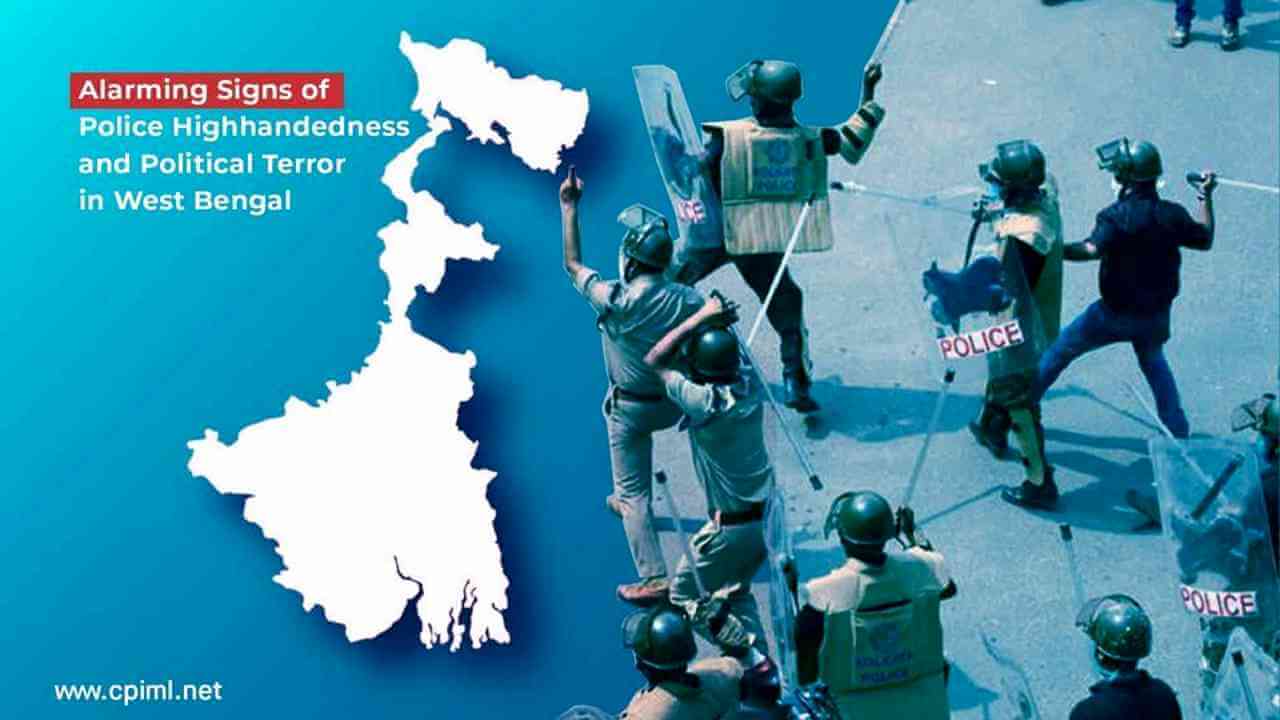Alarming Signs of Police Highhandedness and Political Terror in West Bengal

The chilling midnight murder of Anish Khan, former student leader of Kolkata’s Aliyah University and a familiar face of Kolkata’s CAA protests and various solidarity campaigns, by pushing him down from the roof of his own three-storied home at Amta in Howrah district has justifiably triggered massive public anger in West Bengal. According to his father, a gang in police uniform barged into their house around midnight on 18 February and while one of them stopped him at gunpoint, others went up and threw Anish down from the roof. Even as an injured Anish succumbed to death, the gang fled leaving the family absolutely traumatised.
This shocking murder has raised many questions. The district police administration and the local police station have officially denied any police involvement in the incident. Was the murder then perpetrated by goons wearing police uniform? Or was it a joint action with unauthorised participation and patronage of sections of local police? Are the perpetrators backed by the local unit of the ruling TMC? The question arises particularly in view of a complaint made by Anish on 24 May 2021 to the Amta Police Station requesting protection from local TMC leaders harassing and attacking him and his family members for the TMC’s relatively poor showing in that locality. According to the letter he had to flee the area for his safety.
It is not known if and how the Amta Police Station responded to this letter. What is now known is that Anish’s worst fears came true. The questions arising from the murder of Anish Khan demand an early answer. With the Chief Minister herself looking after the ministry of Home and Hill Affairs in the state, the government must respond immediately at the highest level. A credible judicial inquiry and speedy justice is the least that the government must ensure after this shocking murder. Any collusion or lapse on the part of the local police must also be duly probed and action taken to ensure administrative accountability.
The Amta incident appears to be part of a renewed pattern of political terror and police highhandedness in West Bengal. A few days before this shocking murder, West Bengal witnessed chilling custodial violence against Jadavpur University students and democratic rights activists in Narendrapur Police Station in South 24 Parganas District. The students and activists, belonging to AISA, AIPWA and APDR, who had assembled near the police station in question to protest against the harassment meted out to a Dalit writer for a social media post, were brutally assaulted and abused for hours together. As many as eleven activists, including three women, were subjected to brutal physical and mental torture. Even the appeal made by the VC of Jadavpur University for release of the students, including a girl student scheduled to appear for examination, was arrogantly brushed aside by the police. The activists were produced in the court with ropes tied around their waists.
Birbhum district has emerged as another major theatre of terror where the government seems determined to inflict a coal mining project in the face of growing public opposition. The coal mining project, in Deucha-Pachami-Dewanganj-Harinsinga area, advertised as India’s biggest coal block will entail massive displacement of local people, nearly half of them Adivasis, and cause large-scale damage to the environment. The law of the land requires thoroughgoing social and environmental impact studies and public consultation and hearing for any such mega project. But in Deucha-Pachami the process has so far been marked by total lack of transparency and systematic stifling of informed public opinion on the subject.
Local adivasis expressing their apprehension and opposition are being terrorised by the police and goons patronised by the TMC’s Birbhum strongman Anubrata Mandal. Civil society activists visiting the area for independent investigation and interaction with the local people are being regularly threatened and beaten up. Most recently, several activists and local residents have been detained and implicated in false cases following a peaceful public meeting at Dewanganj on February 20 at the call of a local forum formed in defence of land, livelihood and environment. According to media reports, the Adani group, which is showing growing interest in West Bengal, has an eye on this lucrative coal mining project.
In April-May 2021 West Bengal had voted emphatically against the BJP to foil its bid to grab power in the state. The TMC understandably became the biggest beneficiary of this anti-BJP mandate and returned to power for the third successive term with a bigger majority and vote share. This victory of the TMC has reversed the political traffic in West Bengal – turncoats who had made a beeline to join the BJP before the elections are now returning to the TMC in hordes. The renewed pattern of political violence and police highhandedness indicates a complacent ruling party taking the people for granted.
If this pattern continues, the rule of law in West Bengal will get jeopardised and the state will lapse into a reign of lawlessness, terror and police highhandedness. Nothing would be a bigger mockery of the spirit of the 2021 mandate. Progressive democratic forces in West Bengal must therefore step up their assertion and initiative to uphold the banner of democracy and channelize the anger and aspirations of the people in a positive direction so the BJP cannot muddy the water and fish in it. A spirited and determined assertion of the people on the streets of West Bengal alone can answer the brewing crisis of governance in the state.
Charu Bhawan, U-90, Shakarpur, Delhi 110092
Phone: +91-11-42785864 | +91 9717274961 E-mail: info@cpiml.org

